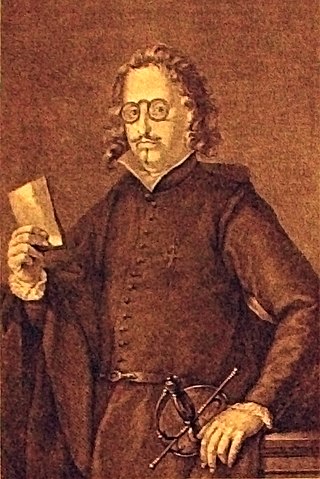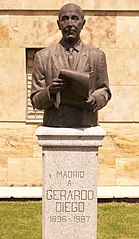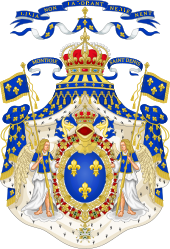Special | A | B | C | D | E | F | G | H | I | J | K | L | M | N | O
P | Q | R | S | T | U | V | W | X | Y | Z | ALL
F |
|---|
Ferdinand II:Ferdinand II (Ferdinando Carlo, 12 January 1810 ? 22 May 1859) was King of the Two Sicilies from 1830 until his early death in 1859.  (source: Wikipedia) | |
|
Francis II:Francis II (Italian: Francesco II, christened Francesco d'Assisi Maria Leopoldo, 16 January 1836 ? 27 December 1894), was King of the Two Sicilies from 1859 to 1861. He was the last King of the Two Sicilies, as successive invasions by Giuseppe Garibaldi and Victor Emmanuel II of Sardinia ultimately brought an end to his rule, and marked the first major event of Italian unification. After he was deposed, the Kingdom of the Two Sicilies and the Kingdom of Sardinia were merged into the newly formed Kingdom of Italy. | |
|
Francisco de Quevedo y Villegas:Francisco G?mez de Quevedo y Santib??ez Villegas (Spanish: [f?an?θisko ?e ke?βe?o]; 14 September 1580 ? 8 September 1645) was a Spanish nobleman, politician and writer of the Baroque era.  Along with his lifelong rival, Luis de G?ngora, Quevedo was one of the most prominent Spanish poets of the age. His style is characterized by what was called conceptismo. This style existed in stark contrast to G?ngora's culteranismo. (source: Wikipedia) | |
|
Freedom quotas from Zorba the Greek:?If I am in the mood, I will play. I will sing. And I will dance the Zembekiko, the Hassepiko, the Pentozalit ? but I tell you plainly from the start, I must be in the mood. Let?s have that clear. If you force me, it?ll be finished. As regards those things, you must realise, I am a man.? ? A man? What do you mean?? ?Well, free!??It is a mystery, he murmured, a great mystery! So, if we want liberty in this bad world, we?ve got to have all those murders, all those lousy tricks, have we? I tell you. If I began to go over all the bloody villainy and all the murders we did, you?d have your hair stand on end. And yet, the result of all that, what?s it been?? ? Liberty!? ?Instead of wiping us out with a thunderbolt, God gives us liberty!? ?I just don?t understand!??How does a plant sprout and grow into a flower on manure and muck? Say to yourself, Zorba, that the manure and muck is man and the flower liberty.? ?For hundreds of years, Dante?s verses have been sung in the poet?s country. And just as love songs prepare Italian girls for love, so the ardent Florentine verses prepared Italian youths for the day of deliveries. From generation to generation, all communed with the soul of the poet and so transformed their slavery into freedom? ?Did you hear that bird? It seemed to say something to us, than it flew away.? ?My friend smiled.? It?s a bird, let it sing;? ?it?s a bird let it speak,? he said, quoting a line from one of our popular ballads.? ?How was it that at this moment, at daybreak on this Cretan coast, such a memory should come into my head, together with that faithful verse, and fill my mind with bitterness.? | |
|
G |
|---|
Generation of '27:The Generation of '27 (Spanish: Generaci?n del 27) was an influential group of poets that arose in Spanish literary circles between 1923 and 1927, essentially out of a shared desire to experience and work with avant-garde forms of art and poetry. Their first formal meeting took place in Seville in 1927 to mark the 300th anniversary of the death of the baroque poet Luis de G?ngora.  Monument to Gerardo Diego, Madrid. Writers and intellectuals celebrated an homage in the Ateneo de Sevilla, which retrospectively became the foundational act of the movement. One of the members of this group was Federico Garc?a Lorca. (source: Wikipedia) | |
|
Giuseppe Garibaldi:Giuseppe Garibaldi (Italian pronunciation: [d?u?z?ppe ?ari?baldi]) (July 4, 1807 ? June 2, 1882) was an Italian general and politician. He is considered, with Camillo Cavour, Victor Emmanuel II and Giuseppe Mazzini, as one of Italy's "fathers of the fatherland". Garibaldi was a central figure in the Italian Risorgimento, since he personally commanded and fought in many military campaigns that led eventually to the formation of a unified Italy. He generally tried to act on behalf of a legitimate power, which does not make him exactly a revolutionary: for example, he was appointed general by the provisional government of Milan in 1848, General of the Roman Republic in 1849 by the Minister of War, and led the Expedition of the Thousand on behalf and with the consent of Victor Emmanuel II.  He has been called the "Hero of Two Worlds" because of his military enterprises in South America and Europe. These earned him a considerable reputation in Italy and abroad, aided by exceptional international media coverage at the time. Many of the greatest intellectuals of his time, such as Victor Hugo, Alexandre Dumas, and George Sand showered him with admiration. The United Kingdom and the United States helped him a great deal, offering him financial and military support in difficult circumstances. In the popular telling of his story, he is associated with the red shirts worn by his volunteers in lieu of a uniform. (source: Wikipedia) | |
|
H |
|---|
Henryk Sienkiewicz:Henryk Adam Aleksander Pius Sienkiewicz (Polish pronunciation: [?x?nr?k ?adam al??ksand?r ?p?us ????k?ev?it??]; also known as "Litwos" [?litf?s]; May 5, 1846 ? November 15, 1916) was a Polish journalist and Nobel Prize-winning novelist. A Polish szlachcic (noble) of the Oszyk coat of arms, he was one of the most popular Polish writers at the turn of the 19th and 20th centuries, and received the Nobel Prize in Literature in 1905 for his "outstanding merits as an epic writer." Henryk Sienkiewicz, portrait by Kazimierz Mordasewicz (1899) Born into an impoverished noble family in Russian-ruled Poland, Sienkiewicz wrote historical novels set during the Rzeczpospolita (Polish Republic, or Commonwealth). Many of his novels were first serialized in newspapers, and even today are still in print. In Poland, he is best known for his historical novels "With Fire and Sword", "The Deluge", and "Pan Michael" (The Trilogy) set during the 17th-century Polish-Lithuanian Commonwealth, while internationally he is best known for Quo Vadis, set in Nero's Rome. Quo Vadis has been filmed several times, most notably the 1951 version. Latarnik (Lighthouse Keeper) is a short story writen by Henryk Sienkiewicz in 1881. (source: Wikipedia) | |
|
House of Bourbon:The House of Bourbon is a European royal house of French origin, a branch of the Capetian dynasty. Bourbon kings first ruled Navarre and France in the 16th century. By the 18th century, members of the Bourbon dynasty also held thrones in Spain, Naples, Sicily, and Parma. Spain and Luxembourg currently have Bourbon monarchs.  Bourbon monarchs ruled Navarre (from 1555) and France (from 1589) until the 1792 overthrow of the monarchy during the French Revolution. Restored briefly in 1814 and definitively in 1815 after the fall of the First French Empire, the senior line of the Bourbons was finally overthrown in the July Revolution of 1830. A cadet branch, the House of Orl?ans, then ruled for 18 years (1830?1848), until it too was overthrown. The Princes of Cond? were a cadet branch of the dukes of Vend?mes and, in turn, were senior to the Princes of Conti both of which are now extinct. Philip V of Spain was the first Bourbon of Spain. The Spanish Bourbons (in Spanish, the name is spelled Borb?n) have been overthrown and restored several times, reigning 1700?1808, 1813?1868, 1875?1931, and 1975 to the present day. From this Spanish line comes the royal line of the Kingdom of the Two Sicilies (1734?1806 and 1815?1860, and Sicily only in 1806?1816), the Bourbon of the Two Sicilies family, and the Bourbon rulers of the Duchy of Parma. Grand Duchess Charlotte of Luxembourg married a cadet of the Parmese line and thus her successors, who have ruled Luxembourg since her abdication in 1964, have also been members of the House of Bourbon. Isabel, Princess Imperial, the declared heiress and thrice-regent of the now-defunct Empire of Brazil, married twenty years before their deposition Prince Gaston, Count of Eu, their descendants, known as the Orl?ans and Braganza, would have ascended to that throne had the empire not ended in 1889. From the time of Hugh Capet to Charles X (987?1830), the senior Capets were also the Kings of France. In 1589, Henry IV of France, head of the House of Bourbon, became the senior Capet, following the extinction of male line of the House of Valois. All members of the House of Bourbon and its cadet branches alive today are direct agnatic descendants of Henry IV. (source: Wikipedia) | |
|
J |
|---|
Jos? Lu?s Peixoto:Jos? Lu?s Peixoto (born 4 September 1974, in Galveias, Portalegre, Portugal), is a Portuguese writer who has written fiction, poetry, drama, lyrics and has participated in a wide number of projects involving writing.  (source: Wikipedia) | |
|
Joyce Carol Oates:Joyce Carol Oates (born June 16, 1938) is an American author. Oates published her first book in 1963 and has since published over fifty novels, as well as many volumes of short stories, poetry, and nonfiction. Her novel them (1969) won the National Book Award, and her novels Black Water (1992), What I Lived For (1994), and Blonde (2000) were nominated for the Pulitzer Prize.  As of 2008, Oates is the Roger S. Berlind '52 Professor in the Humanities with the Program in Creative Writing at Princeton University, where she has taught since 1978. (Source: Wikipedia) |
